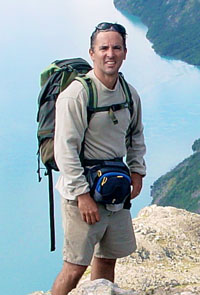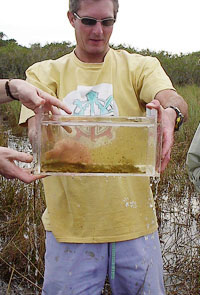February 28, 2011
Dear Board Member,
This month we feature Dr. James Elser and Dr. Dan Childers in a video interview examining their work as leaders of the global Sustainable Phosphorus Initiative. This interview follows our briefing on recent sustainability news and activities, below.
Highlights of ASU sustainability activities
-
Three ASU Sustainability Scientists were chosen to speak at the prominent Annual Meeting of the American Association for the Advancement of Science held in Washington, D.C., Feb. 17-21. B.L. Turner spoke on the complexities of change in tropical forests; C. Michael Barton presented new methods for using archaeological findings to inform future decisions; and J. Martin Anderies discussed policy frameworks for marine ecosystems.
-
The Sustainability Review, an online publication edited and produced by graduate students at Arizona State University’s School of Sustainability, launched its second year of publication with several upgrades to expand its reach to sustainability scholars, professionals, and the public at large. Among these, the publication rate will jump from two to five issues per year, readers can now comment on articles, and a new features section looks at examples of sustainability in practice. The first issue of 2011 includes an op-ed by Rick Shangraw on the need for rapid innovation to address sustainability concerns.
Read more » | Read op-ed »
-
ASU Campus Harvest again attracted hundreds of volunteers to help collect about six tons of oranges from 265 trees across campus. Led by Liberal Studies graduate student Dawn Ratcliffe, who coordinates the volunteer efforts as part of her Master’s thesis requirement, the program sells much of the harvest to local businesses, reduces landfill waste, and provides income for ASU’s non-profit arboretum.
Read more »
-
Two Sustainability Scientists leading a team of researchers at work in the 71,000-acre Agua Fria National Monument north of Phoenix are unearthing sustainability lessons from ancient arid-land farmers. Katherine Spielmann, a professor in the School of Sustainability and the School of Human Evolution and Social Change, and Sharon Harlan, associate professor in the School of Human Evolution and Social Change, are finding exactly where and how prehistoric people dry-farmed desert mesas and grasslands and determining what impacts it had on local ecology historically and today. Evidence from the work may inform modern arid-land farmers globally.
Read more »
-
ASU’s 3-day Sustainable Phosphorus Summit attracted more than 100 attendees from 13 countries including representatives of business, government, K-12, non-profits, and universities. Its interdisciplinary mix served to stimulate a book project, an art show, many new collaborations, and a broad consensus statement to stem waste by closing the human phosphorus cycle. As the first international gathering on sustainable phosphorus in the U.S., the summit enjoyed a host of notable speakers. Presenters included journalist Andrew Revkin, creator of the “Dot Earth” blog at the New York Times, and biologist Cecil Forsberg, Canadian co-inventor of Enviropig, a line of pigs genetically modified to produce less phosphorus waste.
Read more » | Consensus »
Please feel free to email or call us with any questions or comments about this briefing.
Best regards,
cc: Jim Buizer
� |
Q&A with Drs. James Elser and Dan Childers
leading the global Sustainable Phosphorus Initiative
|
|
The element, phosphorus, is essential to all life, but current human use is unsustainable. The Sustainable Phosphorus Initiative – ASU’s solution-driven response to the challenge of phosphorus supply volatility, waste, and pollution – works to build scientific consensus on the challenge, establish a global network of interdisciplinary research focused on phosphorus sustainability, and motivate change in the way we all use phosphorus.
Dr. James Elser is a Distinguished Sustainability Scientist in the Global Institute of Sustainability and Regents’ Professor and Associate Dean in the School of Life Sciences. His primary research focuses on the balance of energy and chemical elements in living systems, and through his work with aquatic organisms in lakes he became involved with the issue of sustainable phosphorus. He is a Fellow of the American Association for the Advancement of Science and teaches the course, “The Living World.”
Dr. Dan Childers is a Senior Sustainability Scientist in the Global Institute of Sustainability, a professor in the School of Sustainability, and director of the Central Arizona–Phoenix Long-Term Ecological Research project, a large interdisciplinary effort to understand the workings of an arid urban ecosystem over time. His research focuses on wetland ecosystem ecology, particularly factors affecting production, nutrient cycling, and soil dynamics. He teaches the courses, “Sustainable World” and “Sustainable Ecosystems.”
In the following video, Elser and Childers discuss how they came to recognize the seriousness of phosphorus geoeconomics and waste, what their research is doing to effect change, and how the Sustainable Phosphorus Initiative fits into the larger sustainability challenge.
|
 |
Dr. James Elser
|
 |
Dr. Dan Childers
|
|
Watch interview/read transcript

|






